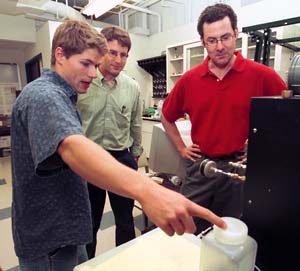While some students occupy their summers with carefree activities, others are spending 10 weeks at the University designing independent research projects focused on cleaning up the environment.
The National Science Foundation is sponsoring 15 undergraduates from around the country in a program known as Research Experiences for Undergraduates (REU). Five Washington University undergraduates also are participating in REU, thanks to funding from individual research grants.

Brian A. Wrenn, Ph.D., assistant professor of civil engineering, has organized this year’s program.
“For many students,” Wrenn said, “this is the first real lab experience that they have had.”
Pratim Biswas, Ph.D., the Stifel and Quinette Jens Professor of Environmental Engineering Science and director of Environmental Engineering Science, is one of many faculty advisers to students in the program. He noted that the University takes a distinct approach through its incorporation of four special workshops.
“These workshops are really a unique aspect,” Biswas said. “This is a national program. There are many such REU sites, but Brian has taken the lead in formulating these workshops, which really are essential for someone who is getting into research.”
The workshops are designed to introduce students to the basic tools and methods of formal research. The first is a review of basic statistics, followed by a workshop dealing with the design of manipulative experiments.
The third workshop, presented by Jay Turner, Ph.D., associate professor of chemical engineering, is tailored for students working with observational studies, where the environment surrounding the data collection isn’t controllable. The fourth workshop, run by Stefan Falke, Ph.D., assistant professor of mechanical engineering, deals with analysis of spatial data.
“The workshops present the types of things that all people who are involved in quantitative research have to do but for which there frequently isn’t good training,” Wrenn said. “Through these workshops, we’re trying to introduce them to these tools as well as the philosophy of how to design a research project.”
In addition to the workshops, each student must prepare an independent research project that will be completed under the guidance of a faculty member. This provides practical experience with experimental design, data collection, data analysis and its application in environmental engineering.
Each student will then present his or her research findings at a formal public symposium Aug. 1 in Lopata Hall, Room 101.
Prior to the symposium, however, students are given the opportunity to present their hypotheses at more low-key seminars. Here they receive feedback from both fellow students and faculty on how to improve both their projects and presentations.
“The planning stage is really important,” Wrenn said. “We try to encourage them to talk about what they expect to observe, how they expect to analyze their data, etc. We try to get them to think about that from the start.”
For many students, Wrenn explained, this opportunity to give seminars is the first they’ve ever had.
“That’s one of the goals of the REU program,” he said. “In addition to giving students experience doing research, we’re also teaching them how to communicate the results of their research.
“Research that doesn’t get communicated is the equivalent of not having been done.”
Other “real world” experience in the program consists of several field trips to environmental engineering facilities such as Doe Run Co. and the Conoco-Phillips wastewater treatment refinery. Wrenn focuses on the differences and similarities between regulatory monitoring and research monitoring.
“We try to get the people giving tours to talk about data collection and analysis in the context of a real, practical application; how somebody outside of research might deal with data, what they are interested in, and other aspects of industrial environmental engineering,” he said.